17:55
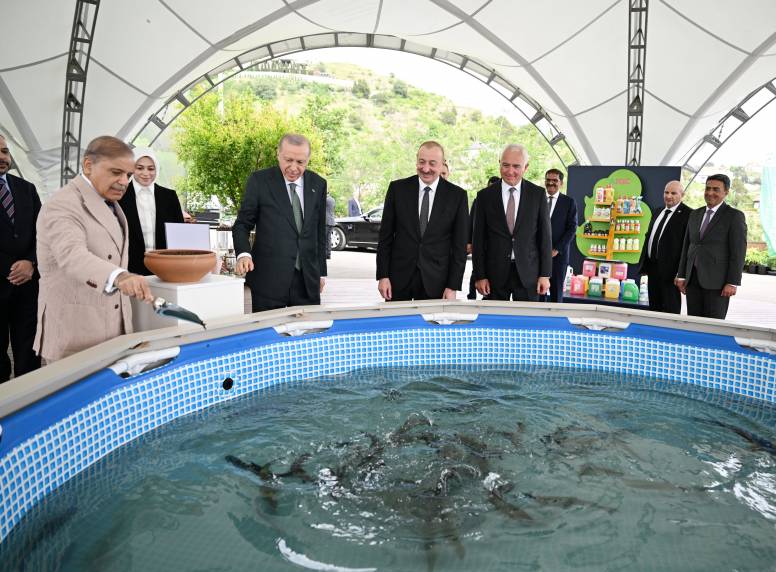
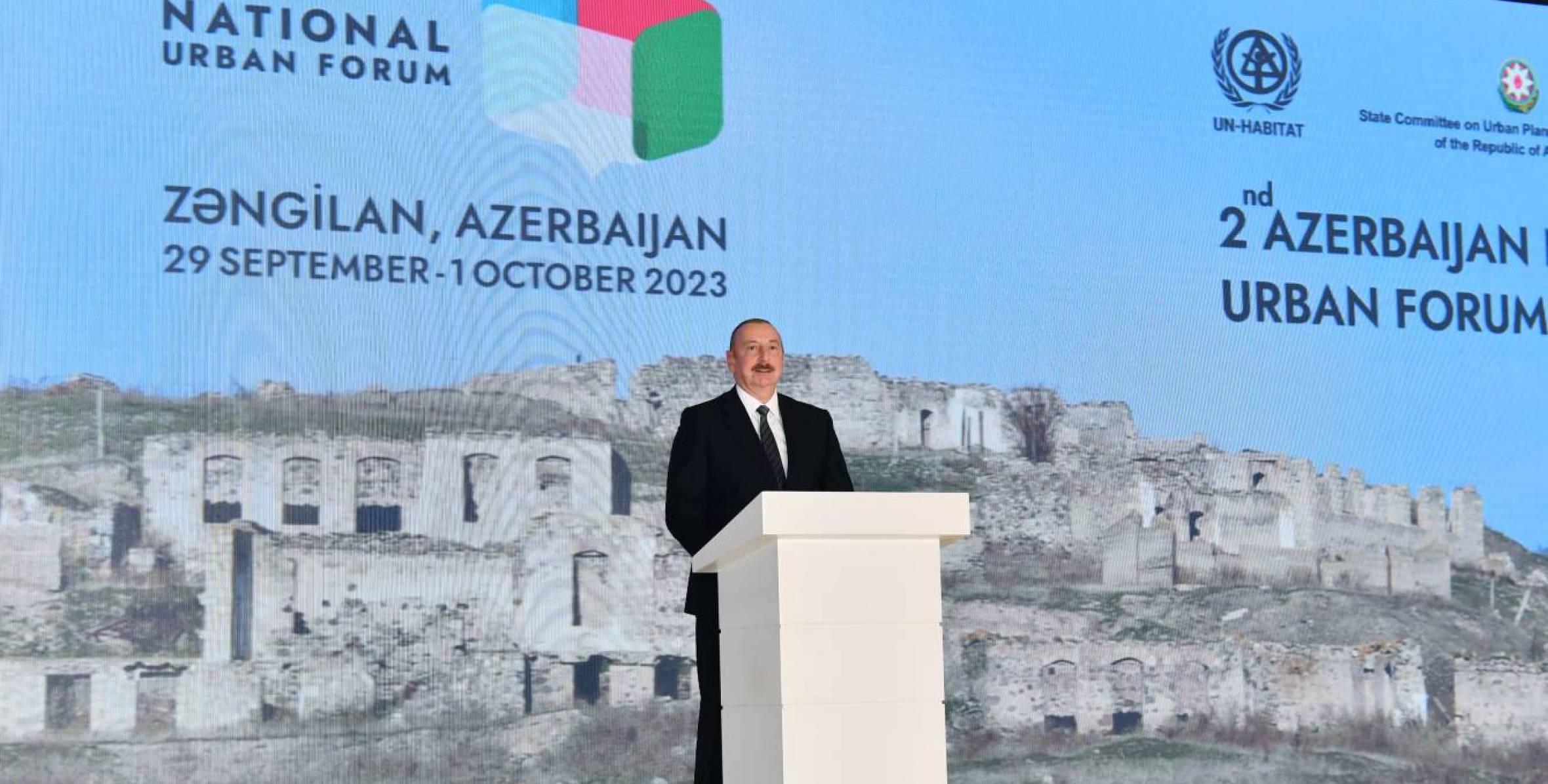
- Dear Executive Director of the UN-Habitat,
Dear guests, ladies and gentlemen.
Welcome to Zangilan! I welcome you here to the ancient region of Azerbaijan, East Zangazur, which is now being completely reconstructed along with the Karabakh region of Azerbaijan.
I would like to express gratitude to all our guests. We have guests from 53 countries, almost 200 foreign guests and a total of 400 participants. This is the 2nd Azerbaijan National Urban Forum and a reflection of our friendship. It is a reflection of our common interest to see totally destroyed areas during the occupation being rebuilt.
I want to express special gratitude to Madame Executive Director for her constant support of our initiatives and valuable recommendations regarding urban planning. We build cities and villages from scratch. Therefore, we need to apply modern technologies and create the best conditions for former refugees already returning.
Last year, we held the 1st National Urban Forum in the city of Aghdam, which was also totally destroyed, and now there is also an extensive construction activity there.
Zangilan was the first region of the liberated territories, which had already received the first former refugees. The smart village of Aghali, partially shown in the video, was inaugurated last spring. Those people and their families already live freely and happily. When I visited Aghali village many times before the return, during the return, and after, I witnessed that people who return there are so deeply connected to their roots. The young generation, who didn't ever see their homeland because of 30 years of occupation, returned. It demonstrates that the people of Azerbaijan are deeply connected to their roots, and all the former refugees were waiting for the time when our land would be free and they would have a chance to come back. They were deprived of that chance by Armenia for 30 years. But three years ago, we put an end to the occupation.
Now, Zangilan hosts an international event. This newly built Convention Center was officially opened yesterday. And not only this but in different parts of the Zangilan region, there an active construction. As I mentioned, the first smart village, Aghali, is in the Zangilan region. We invest considerably in infrastructure. The city master plan has been approved. Several housing projects are already being implemented, and hopefully, in 2025, maybe even earlier, the first residents of Zangilan city will return.
We consider Zangilan to be an essential transportation destination because of its geographical location and because it is situated on the transportation corridors. Therefore, Zangilan International Airport construction was one of the crucial factors for the region's development and easy people's access. I'm sure there will be many foreign tourists here in the future because Zangilan is one of the most beautiful parts of Azerbaijan. It is all green – hills and mountains, rivers and lakes and a unique ecosystem of Zangilan. It's a big treasure for us. So, I'm sure that as time passes, this will be one of the most attractive tourist destinations in Azerbaijan.
The Zangilan International Airport is the second one we constructed in the liberated territories. The third one in Lachin is being built and will be inaugurated within two years.
At the same time, we are restoring the railroad connection, which existed during the Soviet times. During the times of occupation, the railroad was dismantled by the Armenian occupational forces. So now, the railroad construction from Horadiz to Zangilan is in the active phase. This vital part of the transportation corridor, which will connect Azerbaijan's mainland with the Nakhchivan Autonomous Republic, then with Iran and Turkiye, and further down with Europe, will be completed very soon. Thus, Zangilan will be an important transportation destination - the transportation center because of the airport and railroads. We are now building six and four-lane highways from Baku to Zangilan and all other destinations. More than 2,000 kilometers of roads and highways are being built. So, it's a large-scale construction, and every region of the liberated territories of Azerbaijan has a particular master plan.
So we have the pilot housing project in Zangilan and the pilot agricultural project, a joint venture between Azerbaijani and Turkish companies, Dost Agro Park, dost means friend - which is already functioning. Zangilan will also significantly contribute to food security because six thousand Angus cattle have already been imported, and the total number will increase to 10 thousand. It must be taken into account that there are many pastures in the area, especially in the Lachin and Kalbadjar districts, which has always been a location for cattle farming. So this has great potential.
And, of course, employment. Because people who return to their homeland must be employed, we have a special program, part of a Great Return program for employment, including self-employment, low-interest loans to farmers and social infrastructure. In Zangilan, we already have a school. The big school in the city is being built. The construction of the Zangilan mosque is in the final stage. It is being built just next to the ancient mosque, which was destroyed by the Armenian occupational forces during the occupation, along with 65 other mosques out of 67 that existed. So, 65 have been totally destroyed and two partially destroyed. So that was another sign of urbicide and culturocide against Azerbaijan.
Now, when the owners of these lands are back, we see rapid development. The Great Return program covers the reconstruction of all the liberated territories. Not just reconstruction but reconstruction based on modern technologies - smart city, smart village concept - with the most modern examples of urban development.
Since the Second Karabakh War ended, 7 billion USD has been spent so far from the Azerbaijani budget for the reconstruction of the liberated territories. The minimum budget for next year – which we plan and will soon be discussed in our parliament – is 2.4 billion USD. I can tell you that Azerbaijan implements all these projects at its own expense. We did not get any financial assistance or support apart from two brotherly countries, Uzbekistan and Kazakhstan. The presidents of these countries were very generous to donate – one a school and the other an art center. Uzbekistan constructed a school in Fuzuli, while the other is close to completion.
So, this is a substantial financial burden for Azerbaijan. But the Great Return program implementation is the number one task for us.
People who suffered from the Armenian aggression lived under challenging conditions. They suffered the moral stress. They were deprived of the legitimate right to return to their homeland and visit the cemeteries. Most of the cemeteries, by the way, had also been destroyed by the Armenian occupational forces. They have been waiting for 30 years for when they can return. The Second Karabakh War, which ended with a glorious victory of Azerbaijan, created this opportunity. They are waiting for us to bring them back as soon as possible.
The implementation of the Great Return Program already allowed the return of the former refugees to the cities of Lachin, Fuzuli, and the villages of Aghali, Talish and Zabukh. The master plan of 8 cities and 92 villages has already been approved. Groundbreaking ceremonies for 30 villages have already been completed. In the coming years, there will be large-scale implementation of the housing projects, including in the city of Shusha and other cities. It is a part of the program.
Another part, of course, is infrastructure. For instance, I was participating in the inauguration of the new hydropower plant here in Zangilan yesterday, which has a capacity of 10 megawatts. However, within six months, 40 megawatts will be operational. So far, 90 megawatts of hydropower have been created in the liberated territories. Not to mention that we connected all the liberated territories with the electric system of Azerbaijan. So now, it is fully integrated. The hydropower potential that we will have in the liberated territories by the end of this year will be 170 megawatts and 270 megawatts by the end of 2024, substantially supporting our green agenda. The East Zangazur and Karabakh area has the potential of 10 thousand megawatts of green energy – hydro, solar, and wind. It is a small part of Azerbaijan's potential because the potential of wind energy in the Azerbaijani sector of the Caspian Sea alone is 157 gigawatts. So, Azerbaijan will soon transform into a country exporting green energy, including green energy. The potential here has not only been evaluated - we already have an almost full map of potential – but there will also be projects related to solar energy. Hopefully, a 240-megawatt solar energy power plant will start to be built next year in the neighboring district of Jabrayil.
So, energy potential, transportation, and housing projects are all part of our agenda. We are confident that we will be able to meet our target of resettling more than 100 thousand former refugees within the next three years. By the way, 2,300 former refugees have already been returned, and by the end of this year, their number will be 5,500 thousand.
I also want to bring to your attention that refugees who suffered from the Armenian occupation for 30 years lived in different parts of Azerbaijan. The government tried to take care of them. Every year, we allocated a minimum of 300-500 million USD to implement new housing projects for them. More than 300 thousand have been resettled in decent conditions in the new houses. Nevertheless, when our lands were liberated, we conducted a survey among them, and an absolute majority of them decided to come back. By the way, we have a queue of those who are waiting to come back. They come from Baku, the second biggest city of Sumgayit, and Gandja. They are coming from cities to villages. I think this also should be examined and evaluated. Now, everybody talks about urbanization, including Azerbaijan. For many years, we have had this problem that people are coming from villages to big cities because there are more job and life opportunities. But now, at the same time, we see the opposite. We see the flow from Baku, from Sumgayit, from Ganja, from Mingachevir, from cities to villages, and this demonstrates how Azerbaijani people are committed to their homeland. They want to live on the land of their ancestors.
I think that today here in Zangilan, of course, and during the following days in Baku, when the forum will continue, discussions will be not only about sharing experiences with urban planning and development but also about the future of the region and how we see the future of the region. I want to bring it to your attention. We've been subjected to ethnic cleansing, occupation, and destruction of territories for 30 years. A million Azerbaijanis were deprived of their homes, including more than 200 thousand from today's territory of Armenia. Our villages and cities have been destroyed. For three decades, the occupational forces did not allow us to come back, and they were blocking all the international community's efforts to find a peaceful settlement to the conflict. Negotiations were held since 1992 until 2020. Can you imagine? Twenty-eight years of endless, and now, as we see, useless negotiations produced zero results. If we look at the countries sponsoring these negotiations, we can easily see that the solution would have been found if they wanted. Three permanent members of the United Nations Security Council and three nuclear powers were the co-chairs of the former Minsk group, which had a mandate to end the occupation. That was the OSCE branch, but at the same time, we had a legal basis. We had four UN Security Council resolutions that demanded an immediate, unconditional and full withdrawal of the Armenian forces from the occupied territories. Those resolutions were adopted in 1993. But they were not implemented because of a lack of political will.
Armenia did not want the resolution of the conflict. They wanted to keep the status quo unchanged. They wanted to keep our lands under their control forever. They were conducting illegal settlements, by the way, including in Zangilan. In Zangilan, it was not so widespread. However, in Kalbadjar and Shusha, thousands of illegal settlers came from the Armenian diaspora from the Middle East and other countries.
Armenia was committing crimes and violating all the rules and norms of international law. According to the Geneva Conventions, illegal settlement is considered a crime. But the international community did not impose sanctions on them, publicly accuse them, or call them straightforward to pull the troops back from our territory.
Therefore, the Second Karabakh War started not only because of Armenia's occupational policy but also because the countries that had the mandate to facilitate negotiable peace and that peace was achievable chose to ignore it. Azerbaijan was always very constructive at the negotiation table. We waited 28 years for justice to be restored, but we had to restore it ourselves for 44 days. We did it. The 44 Days War of 2020 was inevitable – first, because of the reasons I already mentioned; second, because Armenia wanted to freeze the situation forever, thinking that new generations of Azerbaijanis would not think about Karabakh. But they were wrong. Today, in the schools of Aghali, Fuzuli, Lachin, Zabukh, and Talish, we have hundreds of children of the families of former refugees who have never seen those places. And yet they are there. Because in the memory of the Azerbaijani people, no one can wipe out the memory of our lands and our history. So it was clear that Armenia wanted to keep the situation under their control as they thought, with no war, no peace, endless negotiations without any result. At the same time, the hopes with respect to the new Armenian government during the last several years also vanished.
As for the previous governments, it was more or less clear. For 20 years, Armenia was run by a criminal regime of war criminals who committed - two presidents of Armenia - themselves participated in the Khojaly genocide. They must be brought to justice for that. They participated in looting and devastating our lands. For 20 years, they tried to use this tactic in our occupied territories and used it also in Armenia.
They now face the hatred of the Armenian people. Unfortunately, the hopes with the current Armenian government were also exaggerated because if it wanted to find peace with Azerbaijan, it was reachable, and Azerbaijan was ready. The international mediators knew it. The former Minsk Group co-chairs knew very well that we were ready to find a peaceful solution based on restoring our territorial integrity and protecting the rights and security of the Armenian minority. We are ready for that now, and after we won the war and after the military operation, which took place ten days ago, we officially declare that the rights and security of the Armenian population of Karabakh will be protected. We already presented to the Armenian community of Karabakh our vision for reintegration, which covers their rights —religious, educational, cultural, municipal, all the rights reflected in international conventions, which Azerbaijan signed in line with our Constitution and our international commitments.
But returning to the situation before the Second Karabakh War, the Armenian government missed the chance. They underestimated us, overestimated themselves, overestimated their plans to use external military support against us, but they miscalculated the situation. And it was clear that Azerbaijan was fighting on its territory. It was our legitimate right, provided by the UN Charter, the right for self-defense, which Azerbaijan used three years ago, and Armenia had to capitulate. But what happened after? After that, almost immediately, we again initiated the beginning of peace negotiations. For a country and the people who suffered from war, hatred, and genocide, that was a powerful political move to offer peace. We then offered to create Armenia-Azerbaijan commissions on the delimitation of borders. But Armenia did not positively respond. By the way, peace negotiations did not lead to any progress. However, within three years, that could have been done. Again, miscalculation and reliance on foreign supporters led them to another difficult situation.
If we look at the rhetoric of Armenian governmental officials, including high-ranking officials, who now try to accuse us of what we have never done – their rhetoric was very clear. In 2019, the current leader of Armenia announced in Khankendi that "Karabakh is Armenia, full stop." And that was the end of the negotiation process. So, that was a red line that shouldn't have been crossed. No one before expressed that wording. That was the end of the ceasefire because there was no use in negotiations when the Armenian leader openly declared that the internationally recognized part of Azerbaijan belongs to Armenia. What kinds of negotiations can be held?
Nevertheless, we thought that probably that was a kind of political mistake. We still had hopes. Then, there was even more. The Defense Minister of Armenia announced that Armenia is ready for a new war with us for new territories. So, they were threatening us with a new occupation. 20% of the occupied territories of Azerbaijan probably was not enough for them. They wanted more. They planned to come to Baku and swim in the Caspian Sea. They planned to come to Baku with tanks. Armenian tanks are in Baku but displayed in the Park of Military Trophies. So many miscalculations and underestimations of Azerbaijan, its will, potential, and power led to a serious disaster for the region.
Still, there was a chance to normalize relations with Armenia after the Second Karabakh War, but they had to put down all their territorial claims and stop articulating contradictory statements. On one hand, the Armenian leader recognized Azerbaijan's territorial integrity. On the other hand, on 2 September, he sent a letter of congratulations to the leader of the fictitious regime on its independence. So how can that match? That again meant the territorial claim against us after three years of a miserable defeat of the Armenian army, when, according to their information, they had more than 12,000 deserters and ran away from our territories like sprinters.
So that was another crossing of the red line. On 9 September - I don't know how many red lines can be - the so-called "parliament" of the so-called "Nagorno-Karabakh regime" elected the so-called "president" by 22 persons. What did this person say in his so-called inaugural speech? That they will fight for their status. What did that mean? How should we have reacted? Could we tolerate that? Of course not. So, all that happened ten days ago is because of an irresponsible policy of the Armenian Prime Minister and separatists in Nagorno-Karabakh sponsored by him.
The anti-terror operation lasted less than 24 hours. Now everybody knows how it ended. Did we continue? No, we stopped. We did not have any intentions to continue. If we wanted to continue, it's not difficult to predict where we could have stopped, if we decided to stop at all. But we didn't. That's not our intention. We recognize Armenia's territorial integrity and declare that, and we mean it because if we had other intentions, on 20 September, things wouldn't have stopped. I want everybody to know it. The Armenian leadership, those who stand behind them, and those who may think about some unacceptable plans against Azerbaijan - my advice is not to test our patience again. We are patient but firm, and we can prove that we are right. Not because we have power but because the truth is on our side.
After what happened on 20 September, it's time really to sit together with teams from Azerbaijan and Armenia and to work on the draft peace agreement. I think, after Azerbaijan restored its sovereignty on 20 September, it will be easier to find a solution, sign a peace agreement as soon as possible, and after that or in parallel with that, actively work on the delimitation of the border and put an end to a long-lasting confrontation. We want peace in Azerbaijan. What we see here in Zangilan demonstrates that we want peace. We want to rebuild the country, bring our former refugees here, and live peacefully. We want peace in the Caucasus. It is reachable, and Armenia should make the choices.
On 8 November 2020, when our army liberated Shusha, that victory symbolized our will. Two days later, Armenia capitulated, and Azerbaijan ended the occupation. On 23 April this year, when we established the border checkpoint on our border with Armenia in the Lachin district, we restored our territorial integrity because we started to control all our borders completely. On 20 September this year, we restored our sovereignty entirely. So, no more gray zones, illegal structures, or separatism on our land. This demonstration of strong political will, unity of the people of Azerbaijan, and the Azerbaijani government's readiness for peace with Armenia is a good signal to all those who still think about revenge and live with revanchist ideas. They need to put that down.
On 20 September, we told separatists, the Armenian Army in Karabakh, to put down weapons, disarm, and leave. And it happened. So, we keep our word. I'm sure that if the Armenian government analyzes correctly the events since the trigger statement "Karabakh is Armenia," articulated by the Armenian Prime Minister in 2019, until 20 September, if the analysis is proper, I think peace is not far away. That's how we see the future of the South Caucasus and the broader region. And from our side, our neighbors and international actors will only see a constructive approach.
So once again, dear guests and friends, welcome to East Zangazur, to Zangilan. I wish the forum success. Thank you.

His Excellency Mr. Ilham Aliyev, President of the Republic of Azerbaijan
Dear President Aliyev,
On behalf of the American people, I want to congratulate you and the people of Azerbaijan on your Independence Day.
We value our relationship with the Republic of...
28 May 2025, 17:40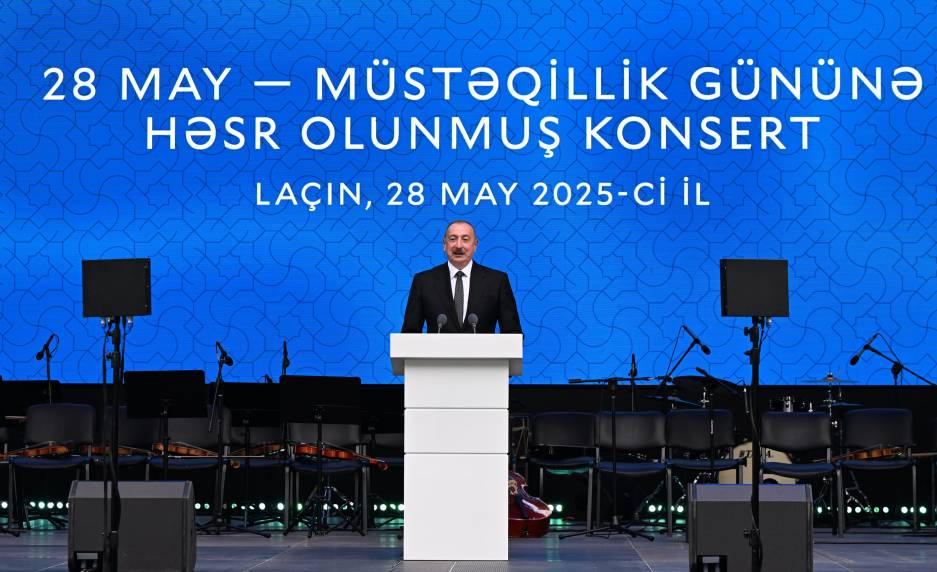
His Excellency Mr. Ilham Aliyev, President of the Republic of Azerbaijan
Dear Mr. President,
On the occasion of Azerbaijan's Independence Day, I extend my warmest congratulations to you and the people of Azerbaijan. I wish your country continued progress,...
28 May 2025, 15:25His Excellency Mr. Ilham Aliyev, President of the Republic of Azerbaijan
Your Excellency,
On behalf of the International Secretariat of the Organization for Democracy and Economic Development - GUAM and me personally, I would like to extend our most sincere...
28 May 2025, 13:58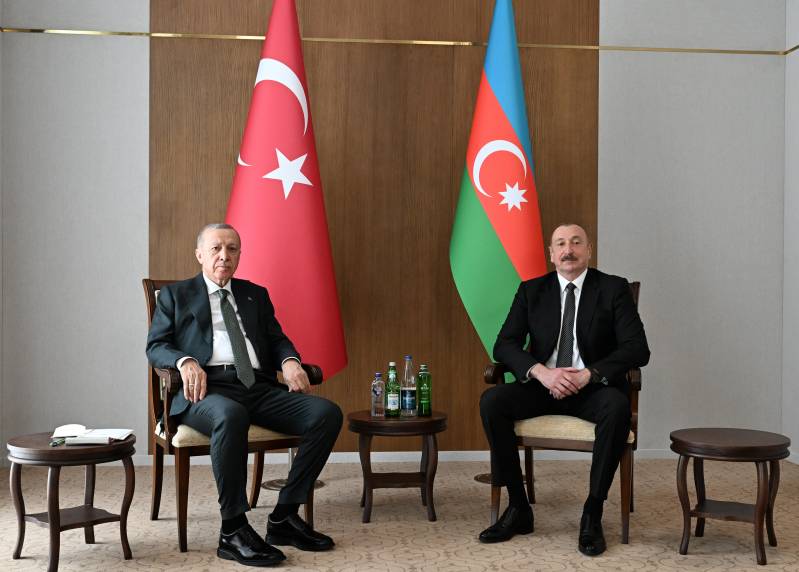
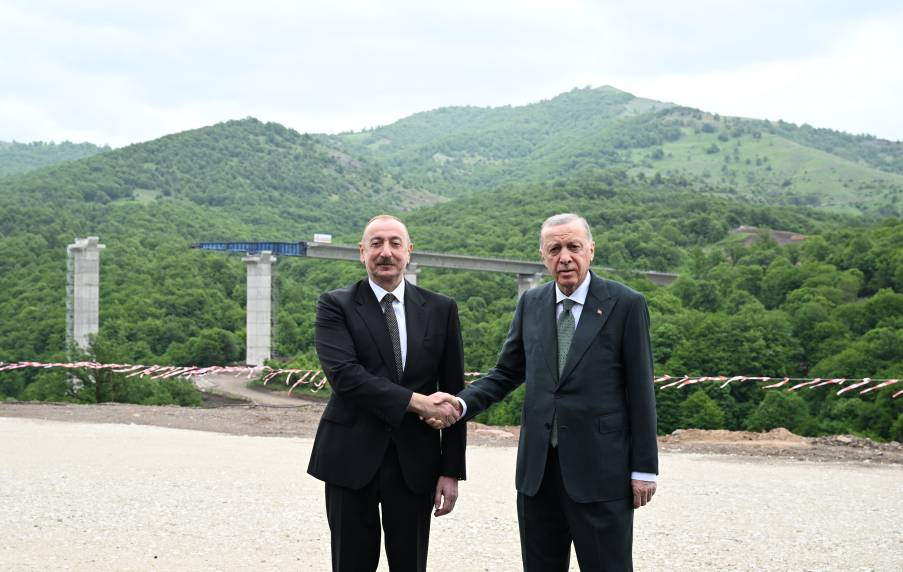
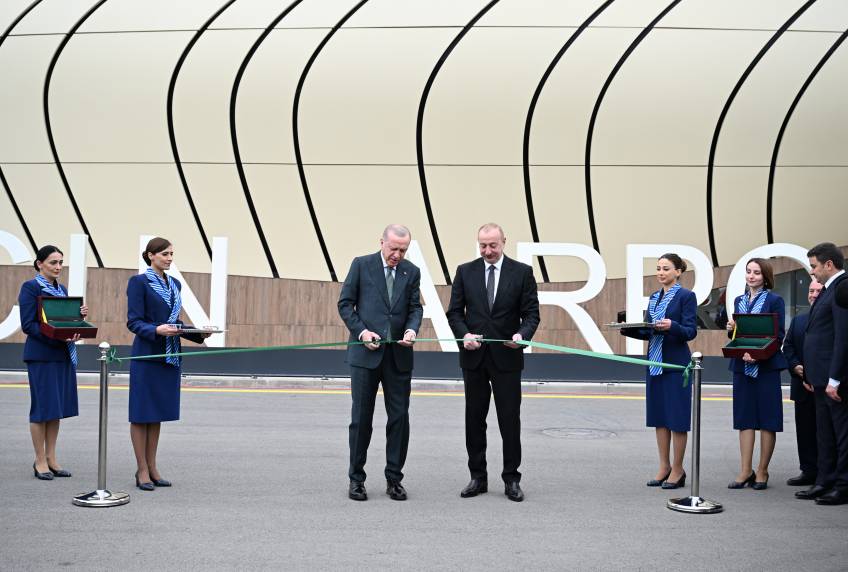
His Excellency Mr. Ilham Aliyev, President of the Republic of Azerbaijan
Dear Mr. President,
On the occasion of the National Day of Azerbaijan, it is with sincere joy that I send Your Excellency, on behalf of the Portuguese people and myself, greetings and wishes of...
27 May 2025, 19:55His Excellency Mr. Ilham Aliyev, President of the Republic of Azerbaijan
Your Excellency, dear friend,
On behalf of the Presidency of Bosnia and Herzegovina and in my personal capacity, I extend to you my heartfelt congratulations on the occasion of May 28 –...
27 May 2025, 19:53His Excellency Mr. Ilham Aliyev, President of the Republic of Azerbaijan
Excellency and dear brother,
As the Republic of Azerbaijan celebrates its National Day, I am pleased to convey to you my sincerest congratulations, wishing your esteemed person continued good...
27 May 2025, 19:51